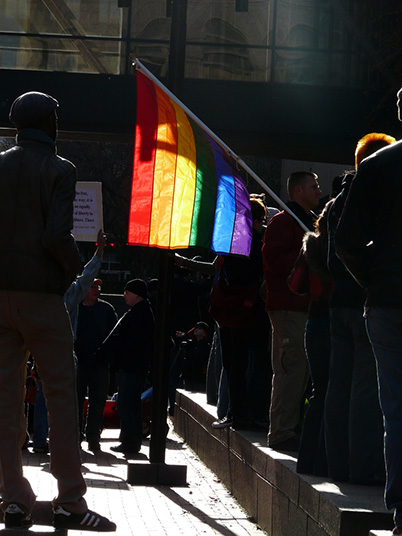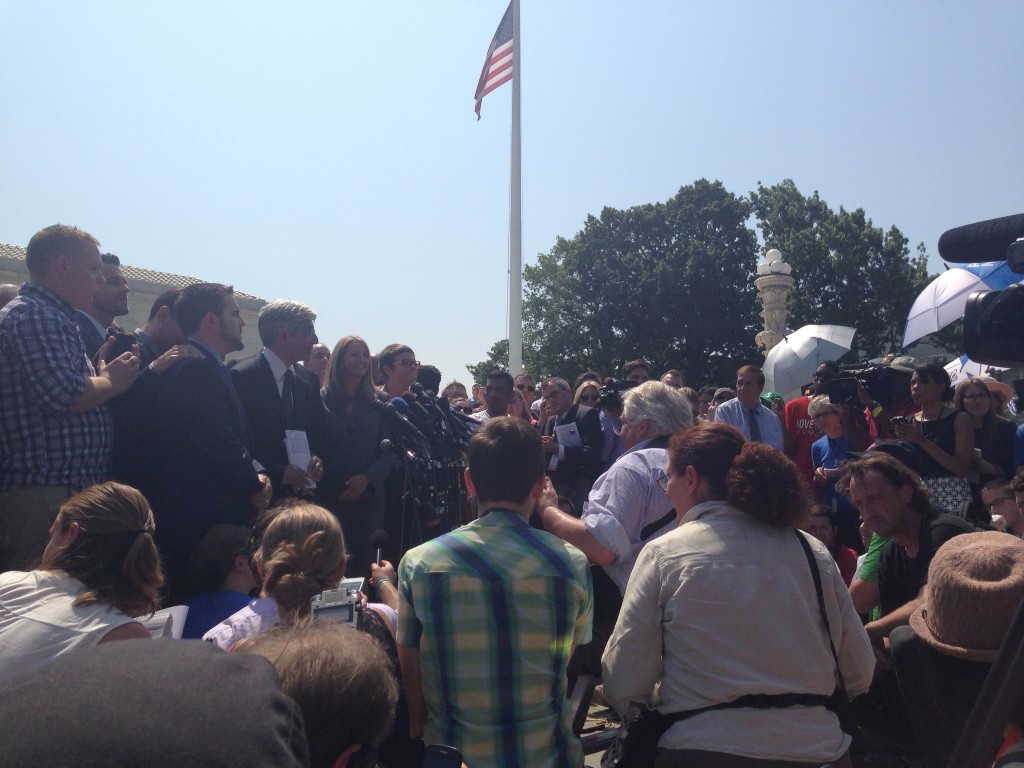
The Supreme Court released its rulings Wednesday on two court cases regarding same-sex marriage, declaring part of the Defense of Marriage Act unconstitutional and dismissing Proposition 8 in California.
DOMA, a Clinton-era act that defined marriage as between a man and a woman, has long denied legally married same-sex couples the federal benefits afforded to heterosexual couples.
In United States v. Windsor, the Court struck down this key section of DOMA with a 5-4 vote. Same-sex couples will now be able to receive benefits and programs the federal government provides to married couples now.
“[DOMA] will allow most same-sex married couples to enjoy the full panoply of over 1,100 rights and responsibilities provided by the federal government — from social security and immigration, to taxes and family medical leave,” said Elizabeth Cooper, a law professor at Fordham University.
However, the Supreme Court’s decision allows part of DOMA to remain in place. Currently, the legal marriage of heterosexual couples is recognized throughout the country by other states. But same-sex marriages are not carried across all state lines.
“The problem with [DOMA’s] particular provision is that states never have to recognize a marriage contracted elsewhere if it would violate the public policy of the current state,” said Grace Blumberg, a law professor at the University of California, Los Angeles.
The Supreme Court also issued a ruling on California’s controversial Prop. 8 on the final day of its term. This amendment was voted into the California state constitution in 2008, barring the state from recognizing marriages that were not between a man and a woman. It ended the brief, five-month period in which same-sex marriages were legally recognized in the state after a ruling by the Supreme Court of California.
The ban was overturned by a federal district court in 2010 and upheld by an appellate court, which prompted supporters of the proposition to bring the case to the Supreme Court. The Supreme Court ruled on Wednesday that the proponents of the ban had no standing to bring the case to Washington. Legal same-sex marriage is expected to resume in California in the coming weeks.
The court’s decision, a 5-4 vote, was less sweeping than desired for some of the more hopeful gay rights activists. While the Court did rule to repeal Prop. 8, this was more of a consequence than the actual intention of the ruling.
“The Prop. 8 ruling was not surprising, but it was a little disappointing,” said Geoffrey Wertime, a third-year NYU Law student and former co-chair of OUTLaw, an organization for LGBT law students and their allies. “Effectively, it means that we get marriage in California, but from a technical, legal standpoint it doesn’t mean exactly that.”
The aftermath
Despite the narrow nature of the Court’s two decisions, some say prominence of the gay rights movement in government is unprecedented and the outcome of these two cases could have consequences for college students across the nation.
“I wouldn’t be surprised to see an upswing in gay-rights activism on campus, something that I personally believe has been lacking,” said Joe Ehrman-Dupre, a Gallatin senior concentrating in sexuality.
Ehrman-Durpe added that the decisions would cause more than just increased activism in LGBT extracurriculars at universities.
“I also wouldn’t be surprised to see NYU students becoming much more vocal overall about their own social and political stances,” he said. “A landmark decision like this always causes people to start talking, and I think we can expect NYU students to share their own stories through social media, through our school papers and blogs, and through artistic projects and papers in our academic courses.”
But Blumberg warned that the legal consequences of the decision in Windsor would not improve the lives of gay Americans in states that do not recognize their marriage, saying that gay rights activists fighting for equal rights would not cite the Supreme Court’s decisions as a sign of the highest court’s backing of the movement.
“[The outcome] doesn’t increase the arguing power of gays and lesbians in states that have been hostile to their relationship,” she said. “If I were gay or lesbian and married, I would stick to friendly places, which violates your right to move freely throughout the United States.”

Public opinion — the opinion of the court?
As recent polls have shown, there has been a noticeable cultural shift of attitudes among Americans toward the LGBT community. While the Supreme Court’s decisions stem most directly from the Constitution, Cooper said the decisions seemed to reflect the justices’ cognizance of shifting public opinion.
“The decisions are a real reflection of how society increasingly believes that gay people deserve to be full citizens, with the dignity and range of rights and responsibilities that are afforded more generally,” Cooper said in an email. “The members of the Court live in the same world as the rest of us — they watch television, read the newspaper, go to movies — and cannot help but be affected by the changing world around them.”
Turchese d’Andrea, an MBA candidate and the president of OUTClass, the graduate LGBT organization at the Stern School of Business, cited President Barack Obama’s endorsement of same-sex marriage and an array of public figures and politicians fighting for marriage equality in their home states as evidence of the shift in public opinion.
“It has been exceptional to see the momentum that gay rights have gained over the last few months in combination with a rapid shift in public opinion,” d’Andrea said. “While there is still work ahead of us to achieve complete equality, these are steps in the right direction.”
Wertime said the younger generation has been the key ingredient in driving increased public awareness of LGBT issues.
“As young people become more accepting of the LGBT community, they will eventually grow up and have kids who are also accepting of LGBT people. Young people have also played a big role in influencing their parents and their parents’ friends who are realizing that all these young people care about these issues,” he said. “Forty years ago, the average person wasn’t even thinking about same-sex marriage.”
Alex Taratuta, chair of Boston College’s GLBTQ Leadership Council and a senior at the college, agreed that heightened visibility of the gay community has helped sway public opinion.
“There is a new image of what it means to be LGBT in America,” Taratuta said. “It is the image of our classmates, coworkers, brothers and sisters, aunts and uncles, and even our parents in some cases. The familiarity with members of the LGBT community has truly changed public opinion of gay rights and has transformed the marriage equality movement.”
The transformation of the gay rights movement
Even with the influx of celebratory headlines and social media reactions, many admit that the landscape of the gay rights movement may see considerable change as the struggle for equality continues.
“These victories are likely to have mixed effects on the U.S. movement for gay rights,” said Judith Stacey, an NYU professor of social and cultural analysis. “They don’t end the movement for same-sex marriage, which will now focus on state-by-state struggles likely to extend for many years until, like with laws banning interracial marriage, a future Supreme Court case will ultimately overturn all state bans.”
Others, including Wertime, feared that the decisions could halt the fight for equality.
“I’m worried that [the outcomes] might take the wind out of the sails for other movements like transgender rights or LGBT people with little income,” Wertime said.
Shana Knizhnik, a second-year law student and political co-chair of NYU’s OUTLaw chapter, said she is more optimistic about the future of the movement.
“Resources primarily going toward marriage equality will be freed up to focus on other issues facing our community, such as youth homelessness, transgender discrimination and criminalization, and racial and economic justice,” Knizhnik said.
But Stacey noted that the decisions may also produce a certain level of complacency for some members of the LGBT community who reside in states that recognize same-sex marriage rights, unintentionally hindering the movement.
“LGBT activists are likely to shift more of their attention to anti-violence and anti-employment discrimination struggles,” Stacey said. “However, there is a significant danger that the general level of activism and mobilization will decline as gays and lesbians increasingly assimilate into mainstream culture.”
Michael Domanico is a copy chief. Email him at [email protected]





















































































































































